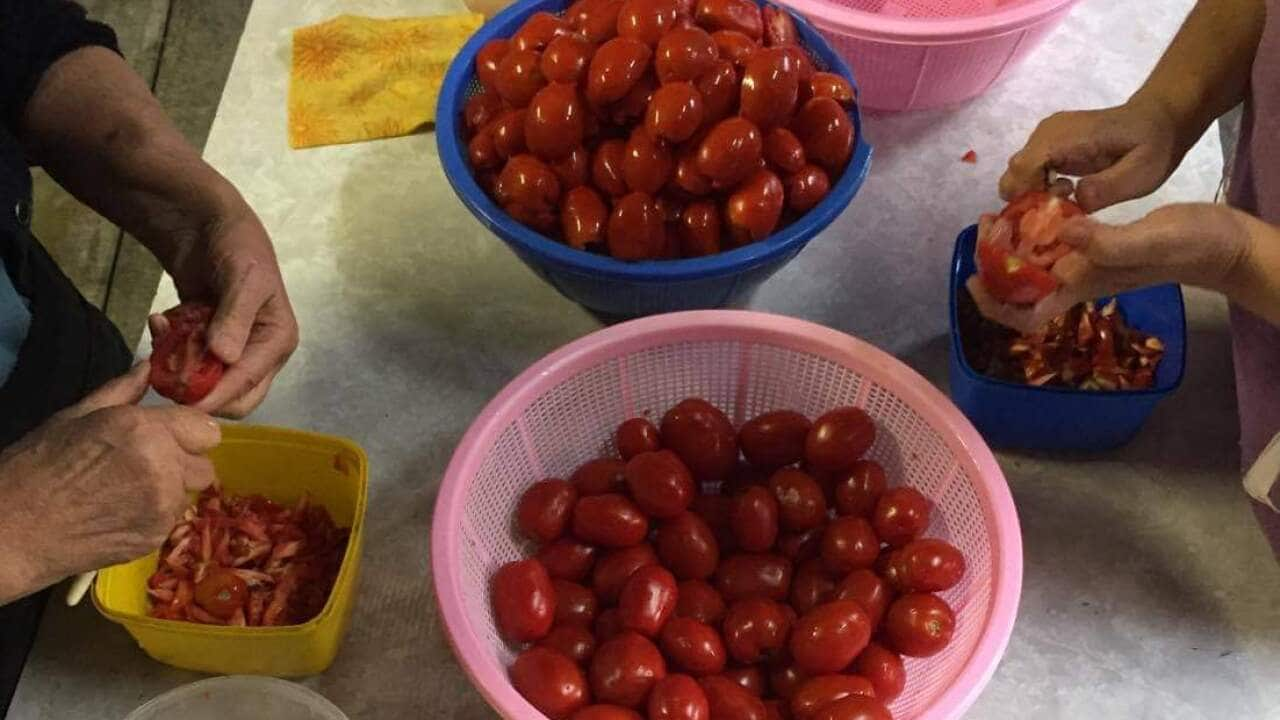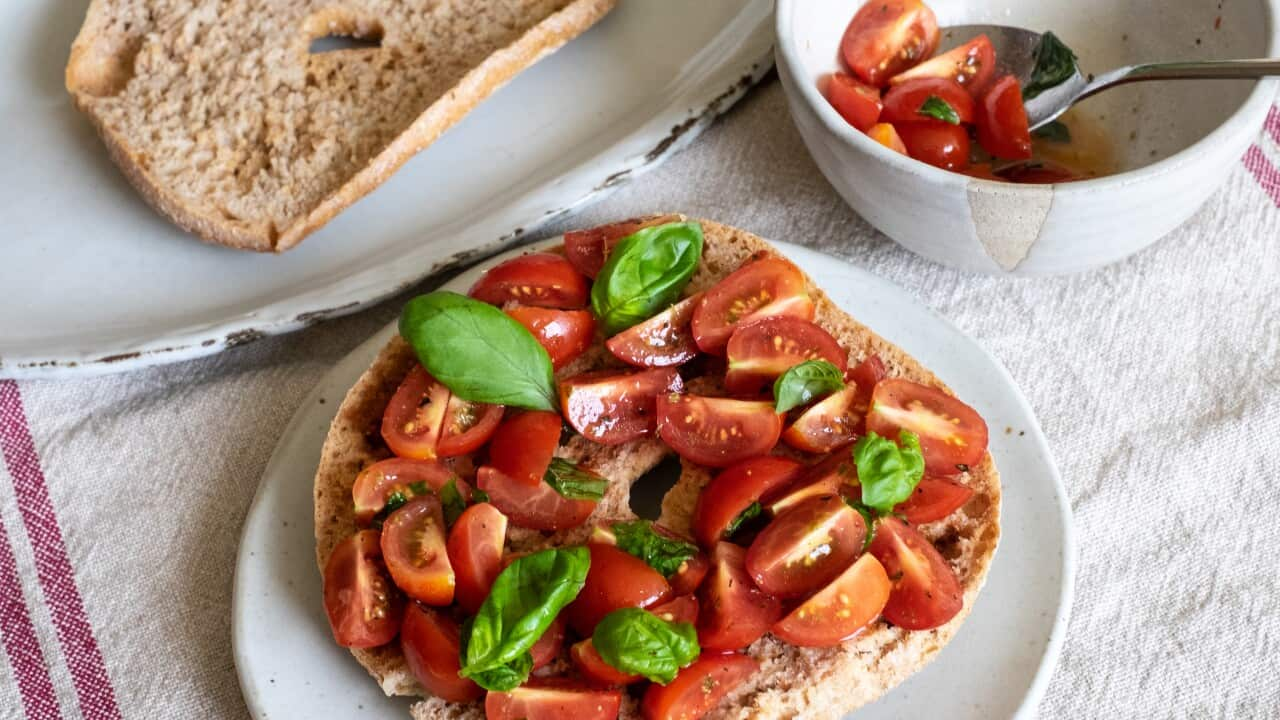Summer to me doesn't just represent blissful days by the beach that can result in rocking the unfortunate red-lobster look. It's also the sight of another shade of red: passata.
Come every summer; our three-generation family production line moves beyond my nonna's garage basement, where we make Italian sausages in winter, to the backyard where we make the Italian staple ingredient.
ANOTHER ANNUAL EVENT

My Italian family's sausage-making day is what keeps our heritage alive
The thick tomato sauce forms the base of the traditional homemade goodness that my nonna cooks: pizza, , gnocchi, whatever the pasta shape and size, we don't discriminate. Its rich flavour is loved by all, and it can be used in many ways, alla 50 Shades of Passata.
Time travellers would be in their element, too, as the output from our Passata Day is reminiscent of an old-school bottle shop storeroom. Antiquated 750 mL dark-brown glass bottles are used to store our family's liquid gold. Indeed, some bottles have been in rotation for decades. Waste not, want not, my grandparents have been part of the recycling movement longer than I have been alive.
Lucky for us, our ample supply of tomato sauce is kept within the family, although sometimes it's gifted to our honorary Italian friends who appreciate the labour of love that goes into each bottle.

Passata Day is a whole family affair. Source: Julia D'Orazio
Passata Day
My late nonno was a handy, resourceful man, to say the least. Each year, he managed to turn his and my nonna's backyard into an open-air factory, using makeshift equipment that required some innovative thinking. He was the Leonardo DaVinci of the family with his great engineering feats.
He repurposed an old 19th-century Wagin hospital copper pot to boil kilos of tomatoes, propped a discarded laundry tub on top of olive buckets to allow the tomatoes to quickly chill in water, and put together a mishmash of devices, including an old washing machine motor, to churn tomatoes into an almost crimson water. Really, who needs to invest in high-tech machinery when nonno's inventive ways do the trick?
We are talking about purchasing 15 to 20 boxes of 10 kg tomatoes. That's a whole lotta sauce to make the pasta go round!
As we grandkids grew older, the family production line became more streamlined. As my sister would say, "many hands make light work". And with his passing in 2018, we Italian-Australian grandchildren only felt more determined to carry on this wholesome family tradition; to bond over food and learn the ropes as to what makes a 'good sugo'.
These days, our family matriarch nonna delegates. Passata Day is not only determined by when the weather is optimal to perform laborious duties but when nonna can score a bargain bulk buy on ripe tomatoes. We are talking about purchasing 15 to 20 boxes of 10 kg tomatoes. That's a whole lotta sauce to make the pasta go round! Our Passata Day is reminiscent of the opening scene in the 90s Australian classic Looking for Alibrandi. There's lots of chatter with typical Italian hands flying everywhere, all the while they're covered in tomato juice. And despite whatever small disagreements may arise (about whether there's enough tomatoes or whether someone's not quick enough at doing their job), its generally good vibes felt all around.
Our Passata Day is reminiscent of the opening scene in the 90s Australian classic Looking for Alibrandi. There's lots of chatter with typical Italian hands flying everywhere, all the while they're covered in tomato juice. And despite whatever small disagreements may arise (about whether there's enough tomatoes or whether someone's not quick enough at doing their job), its generally good vibes felt all around.

Julia D'Orazio's nonna. Source: Julia D'Orazio
For whatever reason, my sister and I perform the not-so-fun nor complex task of cutting the 'bad bits' off the tomatoes (they were cheap for a reason, folks). This is so the sauce won't be tainted with the icky stuff just before the tomatoes are crushed. The bottling begins after the sauce goes through nonno's DIY tomato-crushing contraptions. We put two basil leaves into each bottle before we add the sauce for extra flavour. Once the bottles are 90 per cent full, we seal them with an aluminium bottle cap. Bellissima!
The bottling begins after the sauce goes through nonno's DIY tomato-crushing contraptions. We put two basil leaves into each bottle before we add the sauce for extra flavour. Once the bottles are 90 per cent full, we seal them with an aluminium bottle cap. Bellissima!

Julia D'Orazio's brother Anthony helps prepare the tomatoes. Source: Julia D'Orazio
Once capped, we place the bottles in a heads-and-tails fashion in a drum. We then cover the bottles with water, which we slowly bring to the boil on medium heat. Once the water is boiling, we turn the heat off, and leave the bottles to cool in water before we remove them. This process helps to preserve the sauce, which we then store away in milk crates until we're ready to use the sauce. And I can assure you, it's worth the wait.
Besides its tasty outcome, Passata Day is a family bonding session like no other and proof that in my family, both blood and passata run thicker than water.
Love this story? You can follow the author Instagram
MORE ITALIAN FOOD

Italian sauteed broad beans







